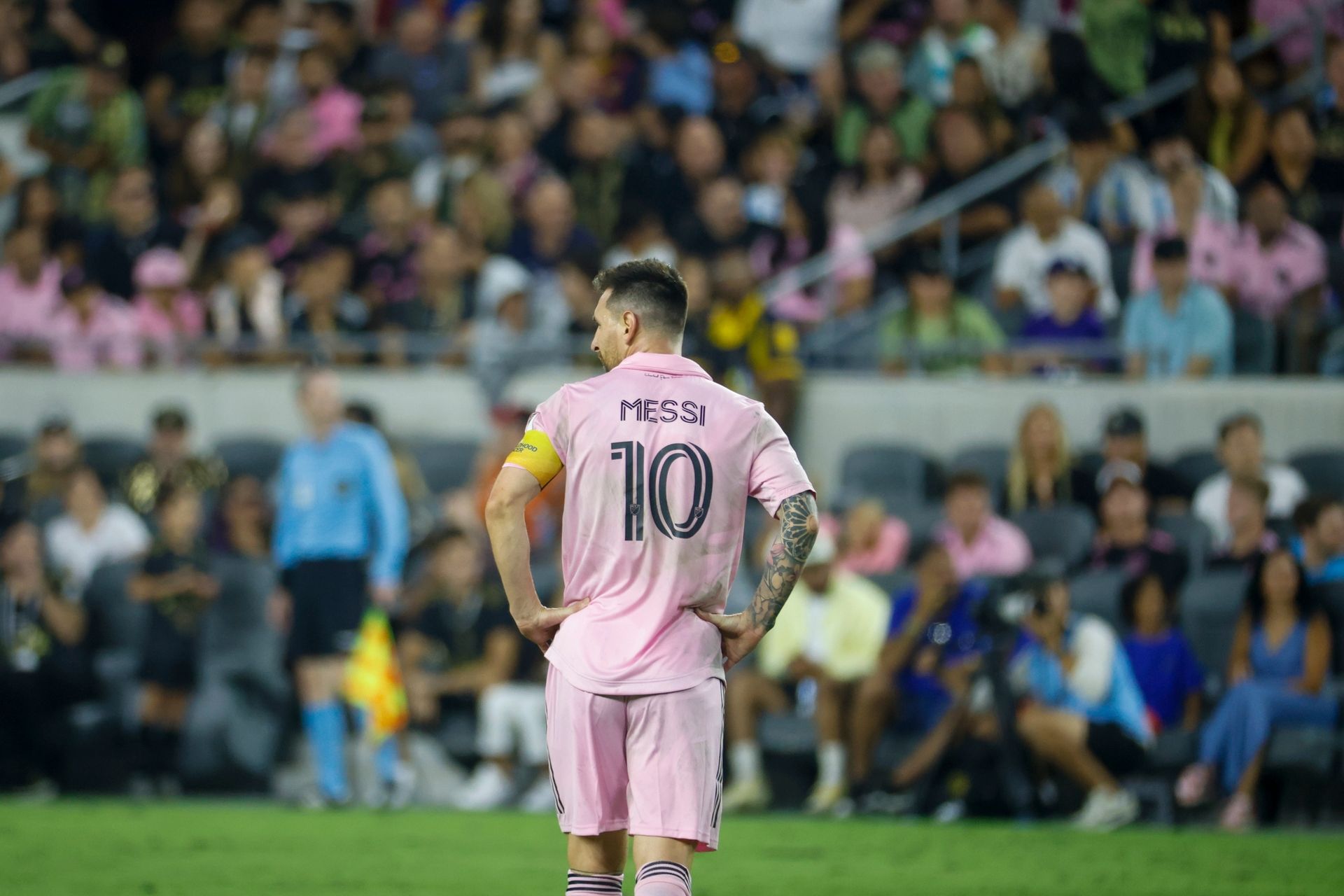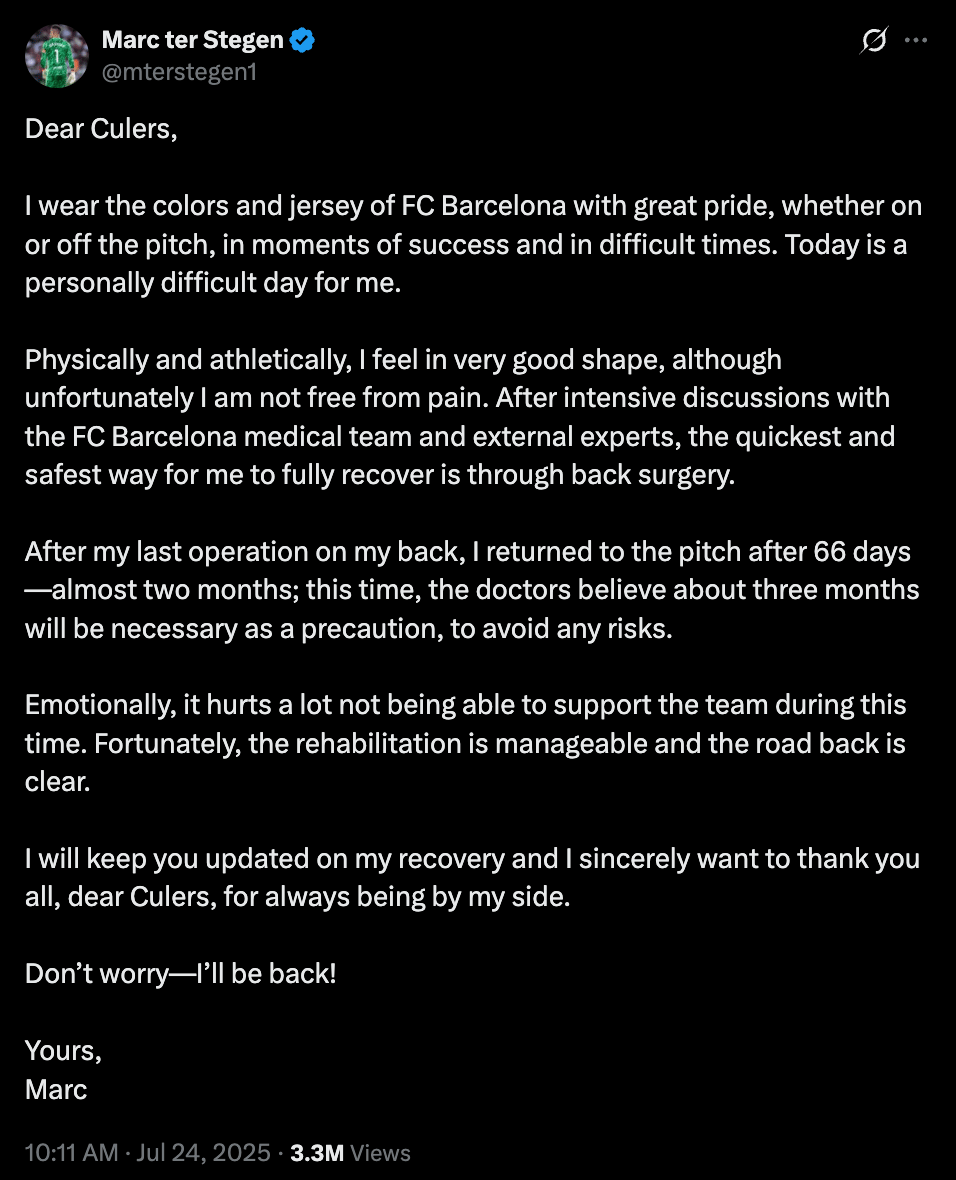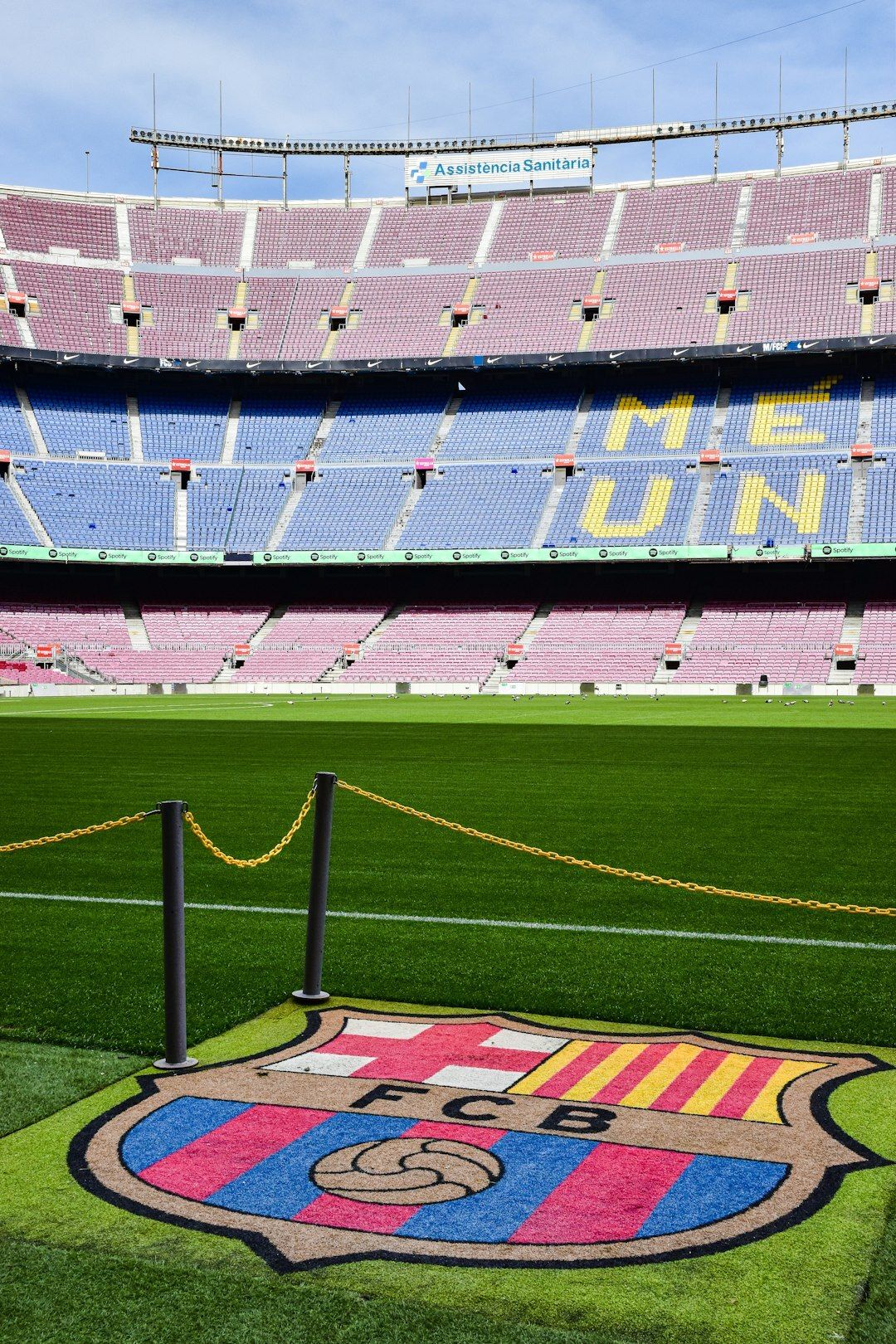- FootBiz
- Posts
- FootBiz newsletter #94: Barcelona's cold war, UEFA peace talks and huge changes for MLS
FootBiz newsletter #94: Barcelona's cold war, UEFA peace talks and huge changes for MLS
PLUS: the state of the player's union and Everton following Chelsea's lead
A couple of little things that caught our eye over the last couple of weeks in an otherwise quiet part of the year.
One of baseball’s biggest stars, Bryce Harper, getting in the face of the MLB commissioner and telling him “if you’re talking about a salary cap you can get the f— out” before the commissioner’s right-hand man allegedly threatened Harper and his teammates with retribution.
Elsewhere, the meltdown atop the NFLPA where the two most senior men at the NFL’s players union have both resigned after covering up a report that detailed collusion at ownership level with the intention of paying the players less guaranteed money.
In a country that is generally fairly hostile to unions, far more so than Europe, the US’ major league unions have been in the news recently because their role — better demonstrated by Harper’s aggravation than the NFLPA’s cowardice — is crucial in maintaining the equilibrium of a closed-system league.
Football’s wild free market makes things a lot more difficult for the players seeking leverage. If a league were to introduce a salary cap, players could (and would) simply go to another league. With competitions competing against each other as well as clubs, it is difficult to see how the players can have more of a say over their future.
And yet the breaking point is surely close?
In some ways, Rodri’s injury last year felt like it could be a watershed moment. The Manchester City midfielder came out between the end of the Euros and the start of the club season to speak about the calendar and the absurd demands on players. Within weeks he had ruptured his anterior cruciate ligament, forcing him to miss the 2025 season.
At a lower level, a bigger issue is the non-payment of wages or footballers having financial difficulties after their playing days are over. A more unified front could begin to address these issues, but who would any wider, large-scale agreement even be with? Despite notionally being responsible for policing the world game, FIFA is the organisation cramming an expanded Club World Cup in at the end of the season. UEFA just expanded the Champions League and would do more if it could.
Nick Miller touched on some of these issues and included a chat with PFA chief Maheta Molango who criticised the treatment of players as “assets” rather than humans. Molango seems to be at least aware of how little power his organisation has, while a recent FT interview with FIFPro secretary-general Alex Phillips was a little heavier on the delusion.
Either way, the push and pull between players and the organisations whose badge you see on the players’ sleeves is becoming a bigger conversation in football. How things progress from here will define the coming decade-plus of football, and with a Saudi World Cup, the possibility of a further expanded CWC and an inevitable rush to play domestic league games in far-flung locations, the players will eventually need to unite in action if they aren’t to continue being steamrolled.
FIFPro’s latest statement is robust, but ultimately faceless coming from a union that few normal people will pay attention to.
For now, it’s hard to imagine a star player getting in Gianni Infantino’s grill and telling him “if you’re talking about an expanded Club World Cup you can get the f—- out,” á la Bryce Harper.
Table of Contents
MLS plan “seismic” changes
Huge changes are coming to MLS that will completely transform the league… just not quite yet.
Commissioner Don Garber described those coming changes as “seismic” as the league looks to adopt a more European calendar, alter roster rules that critics have long felt held the league back and even changing the format of the competition.
It would amount to a serious refresh of the league, designed to make it more internationally competitive but, as with all big changes, could have downstream consequences that will upset people. Not least those in Canada, whose winter will make a European calendar very difficult. CF Montreal’s place in the league is already the subject of whispers that it could be moved, while Toronto’s climate is not much better. Lucrative markets like Las Vegas remain open.
Apple are understood to prefer the so-called FIFA International Match calendar because it would position the league’s playoffs at a better time of the year in late spring. The MLS Cup is currently held in November or December, a time when the US sports calendar is cluttered with NBA and NHL action in addition to college football and the NFL, which dominates television not only for live games but with its relentless news cycle.

MLS changes will take place in a post-Messi world
"We continue to evaluate the potential for a transition to the FIFA International Match calendar," Garber told media during last week’s All-Star break.
"We're not making any announcements today, but we continue to do an enormous amount of work with our fans, with our partners, with all of our chief soccer officers and with our clubs to get ourselves closer to the point we're able to make that decision. But we believe that that alignment is something that makes sense.
"If it's going to happen, it's going to happen after the 2026 World Cup. So making this change is seismic. It's not something we should do lightly.”
An MLS owner told FootBiz that most franchises are supportive of the moves, which wouldn’t take place until 2027 or 2028.
“We obviously have teams across multiple climate zones, multiple time zones, unlike any other league in the world, and if we do make the change, we’re not going to go back on that decision,” added Garber.
While the commissioner gave little detail on the much-wanted overhaul of the current, nonsensical roster rules, he was willing to give a little bit more information on upcoming changes to the competition format.
“It’s going to make the regular season more meaningful,” said the commissioner.
“It’ll be more aligned with the rest of the world in terms of how they play their competition. And I think our playoff format will be really cool, really unique, very different from anything that happens in North America.”
Whether that looks like the playoff format in the Belgian league or another sports league entirely is unclear, but suggests a move away from the classic knockout bracket of American major league playoffs. Perhaps a final four (or eight) in one city?

MLS playoffs won’t look like the NFL’s bracket format in future, says Garber
People on both sides of the Apple-MLS partnership need things to be better, and one tiny little comment from Garber that stood out suggests the league wants the tech giant to somehow get more eyeballs on it’s double-paywalled product, making "it easier for our fans to get access to our game.”
The changes that are being talked about will undoubtedly transform the league, but if they don’t get it right they face a deeper struggle to find relevance both domestically and abroad.
(….and yet random MLS franchises are getting close to ten-figure valuations)
Women’s game has its day in the sun
The 65,000 fans celebrating with England’s victorious Lionesses in front of Buckingham Palace yesterday provided a powerful visual image of the growing popularity of women’s football in the UK, but beyond the natural triumphalism and patriotism the European Championship was a smash hit all round.
With record ticket sales of 657,291 and 29 of the 31 matches sold out UEFA are projecting total revenues from the tournament of €128m revenue. As noted by Swiss Ramble in his excellent blog this week, this was more than double the revenue of the 2022 European Championship in England, a much bigger ticketing and broadcast market, and ten times as much as the €12.7m delivered by Holland in 2017.

England’s women are back-to-back European champions
The majority of UEFA’s income comes from media rights sales of €72m, which have also doubled since 2022, and are set to increase still further given the impressive viewing figures and engagement with the competition. UEFA are claiming a cumulative live TV audience for the tournament of over 400m, and over 500m for all coverage, while in the UK over 16m watched England’s penalty shootout win over Spain. The pace of this growth has been staggering, with UEFA’s combined media rights sales worth €4m just 12 years ago.
For all England’s success the growth in TV audiences has also been relatively recent. The 2019 World Cup in France was the first time the Lionesses genuinely captured the nation’s attention, with a peak audience of 11.7m watching their semi-final defeat to the United States on BBC1, a huge rise on the viewing figures of 2.4m for England’s loss to Japan at the same stage of the tournament four years earlier.
The value of UEFA’s commercial contracts for the women’s Euros is increasing even faster and this market will continue to grow, as more and more brands aimed at women and girls are attracted to the sport. UEFA’s endorsement deals have tripled from €15.3m in 2022 to €41m this summer due to their “family” of 20 partner brands. And the biggest of them, Amazon, announced an extension of a contract that also covers the women’s Champions League until 2030 in the build-up to the final.
The intriguing question is to what extent the club game can capitalise on this huge interest in international football. Although rightly feted within the sport Arsenal’s similarly remarkable Champions League final win over Barcelona in May did not register in the public consciousness, not least as it was televised by DAZN (still with small market penetration) on the same day as the men’s EFL Championship play-off final on Sky. A congested calendar and competition from the men’s game will continue to hinder the prospects of exponential growth for the club game, while the fact that Champions League TV coverage is moving to Disney+ next season is unlikely to help matters.
As Miguel Delaney predicted in his review of the tournament for The Independent, the future for women’s football may look like men’s rugby union: a mass event for the biggest international fixtures such as the Six Nations and World Cups, but a minority pursuit for much of the year. Unlike rugby however, participation at grassroots level at least will continue to grow and the numbers are pointing upwards. Rugby’s future is far more uncertain.
Barca in UEFA peace talks
Barcelona president Joan Laporta has claimed that the European Super League rebels are in talks with UEFA over a peace deal that would lead to further reforms of the Champions League. The most intriguing element of a wide-ranging interview with Spanish newspaper El Mundo Deportivo was Laporta’s suggestion that UEFA could in the future broadcast the Champions League free-to-air, one of the key tenets of the relaunched ESL proposed by sports management company A22 last year.
Barcelona, Real Madrid and A22 are the only remaining members of the ESL alliance, although they claim to have support from another 60 clubs.
“We are now in a situation where the Super League is holding talks with UEFA,” Laporta said. “Aleksander Ceferin has appointed several representatives from UEFA to talk to representatives of the Super League. He has also talked to Bernd Reichart, the CEO of the Super League, and his entire team. I see a lot of will on the part of the UEFA president. And I repeat, Ceferin is a capable and reliable man, and we are working in this direction.
“Now, for example, the new Champions League format has brought in 20 per cent more revenue compared to the previous format. We believe that we can have an important voice in this improvement.
“UEFA is not closed to this issue. As for the platform, if it generates the expected revenue, it will be a very big revenue and it will be for the good of football. I see that UEFA is opening up, and we are also opening up to reach an agreement.”
…while war breaks out at home
Meanwhile, Barcelona and captain Marc-Andre Ter Stegen are engaged in something of a cold war over the goalkeeper’s injury.
The Spanish champions have already replaced the German, who has a curiously antagonistic relationship with the fanbase already, by buying Espanyol’s Joan Garcia for €25m.
Ter Stegen underwent back surgery with the club announcing he would be out for a long time, something of a deliberate move as long-term injuries allow clubs to claim back 80% of the player’s salary as part of their masa salarial - the money they’re allowed to spend on wages.
However, Ter Stegen’s own personal announcement that he would be out for “three months” has enraged club executives.

It is not really a secret that the club would like to sell their high earners, but as with Frenkie De Jong in recent summers, Ter Stegen is on a hefty contract with time to run and doesn’t fancy leaving. The player’s camp has told the club to either find a buyer he approves of or buy him out if they really want him gone - the former hasn’t been possible and the latter would not save them any money at all.
By releasing a personal statement that caught the club unawares, Ter Stegen’s specific timeframe could now also prevent Barca from categorising him as a long-term injury that would provide them with the salary relief they so crave.
Whether this was a deliberate move from his camp to force Barca’s hand in getting him out of the club is anyone’s guess, but given he’s about to spend months on the sidelines it’s difficult to see another club rushing to the front of the queue to sign a 33-year-old who has had two back surgeries in fairly short succession.
A panel of four doctors will read the medical reports and decide whether Ter Stegen’s lay-off would meet the four-month criteria that classifies the injury as long-term.
Should they agree with the German that he’s going to be back before then, this controversy will have another chapter.
Forest to send lawyers to CAS
Nottingham Forest are planning to send a legal team to the Court of Arbitration for Sport represent them at Crystal Palace's appeal against their expulsion from the Europa League next week.
The revelation in the Daily Mail of Forest’s intended presence in Lausanne is likely to enrage Palace chairman Steve Parish, who has complained that Forest’s intervention has got Oliver Glasner’s side demoted to the Conference League.
“If there wasn’t somebody that wanted to get in as a consequence, then there wouldn’t be a problem,” Parish told Gary Lineker on The Rest is Football podcast earlier this month.
Palace were removed from the Europa League because of the dual ownership of John Textor, although he has subsequently sold his stake at Selhurst Park to Woody Johnson, with Forest taking their place.
Palace are expected to accuse UEFA of inconsistent application of their rules in giving Forest additional time beyond the 1 March deadline to address their own multi-club ownership issues. Forest want legal representation at CAS so they are in a position to defend themselves if necessary.
Palace deal confirmed
Crystal Palace have confirmed that Woody Johnson’s minority investment, knocking out John Textor’s stake in the club, has been closed.
The immediate upshot is that, should CAS uphold UEFA’s decision to downgrade them from the Europa League to the Conference League, inserting Nottingham Forest in their place, then European football’s governing body would be eliminating a club that is 100% not part of a multi-club group in favour of a club that 100% is.
Good job everyone.
PL anger over summer series
Manchester United, Everton, West Ham United and Bournemouth are in the middle of a pre-season jolly to the US, participating in the Premier League’s very own Summer Series with back-to-back games in Chicago tonight followed by a trip to Atlanta on Sunday.
The New Jersey double-header last weekend was well-attended as official PL partners activated around the MetLife Stadium event and clubs did their own commercial activations Stateside to make the most of playing a handful of games in the league’s most lucrative market.
But not all clubs are happy with the league putting on a mini-competition to promote itself on American shores. Mike Keegan revealed that clubs who aren’t included in the tournament are “angered” by footing the bill for four teams chosen by the top flight’s organiser. Similarly, they are irritated by the event losing them millions of pounds a year, with Keegan revealing a £5.4m loss for the competition two years ago.
Everton do a Chelsea/Villa
Everton have sold their women’s team to their parent company in a move that will generate additional revenue to help the club comply with Profitability and Sustainability Rules (PSR).
Documents filed at Companies House this week show that Everton Football Club Women Ltd has been transferred to Roundhouse Capital Holdings, a company controlled by Everton’s owner, Dan Friedkin. The value of the sale has not been disclosed.
Everton say the change is to ensure that the women’s team is a standalone entity that can attract its own investment from the United States, although also accept that the profit will help with PSR compliance. Chelsea and Aston Villa have also sold stakes in their women’s team to related companies for PSR purposes.
